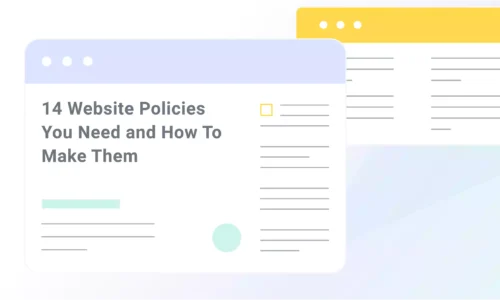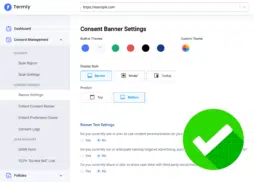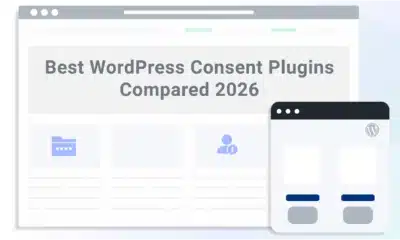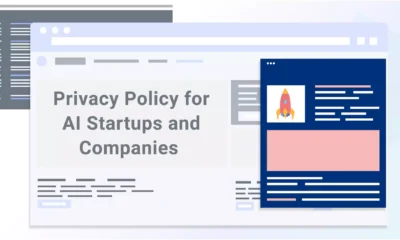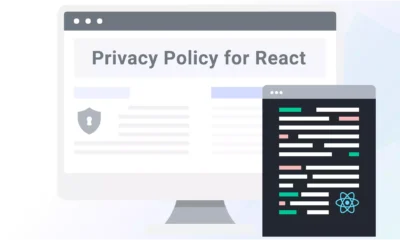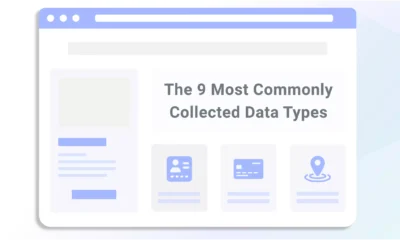Have you ever wondered if your website has all the legal policies it actually needs?
Missing key website policies can put you at risk — but many are easier to create than you think with the right resources and guidance.
I’ve rounded up the 14 essential website policies you should know about and show you how to make them using Termly’s customizable tools so you can approach compliance with confidence.
Are There Essential Policies All Websites Need?
Below, I’ll walk you through each of the 14 essential website policies — what they are, why you need them, and how you can create them.
Privacy Policy
A privacy policy is a legal document that informs your users how your website collects, uses, and manages their personal information.
If you collect personal data, you likely need a privacy policy. For example:
- If you’re a business owner whose site gathers information like names, email addresses, or payment details.
- If you run an online store collecting customer information for transactions.
- If you have a personal blog or website that collects subscriber emails.
Below is an example of how Google presents its Privacy Policy. As one of the largest platforms in the world, Google puts extra emphasis on clarity and accessibility.
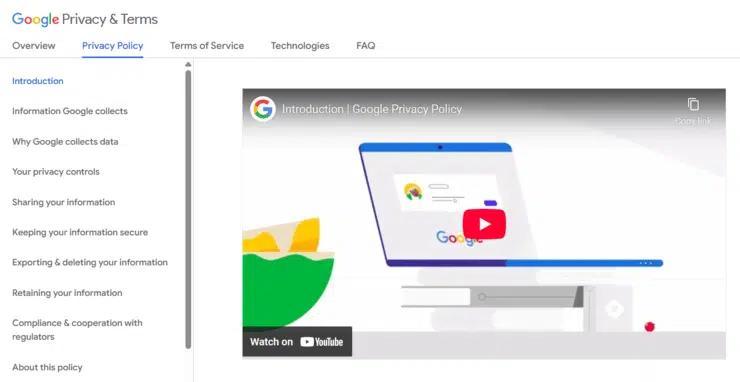
They open the policy with a short explainer video, helping users understand the key takeaways immediately. The page is also structured with a clickable menu on the left side, making jumping to specific sections easy.
Cookie Policy
A cookie policy explains how your website uses cookies and other tracking technologies to collect user data — including what types of cookies you use, their purpose, and how your users can manage or opt out of them.
If you use cookies for analytics or ads, you may be legally required to disclose this.
Below you’ll see Chipotle’s cookie policy, which outlines how cookies and similar tracking technologies are used on their website.

The policy displays a “last updated” date at the top — listed as February 9, 2025.
This is a good way to promote transparency and demonstrate that your business is actively reviewing its data practices.
Terms and Conditions (Terms of Use/Terms of Services)
Terms and Conditions (or Terms of Use or Terms of Service) is a legal agreement between you and your users that outlines the rules for using your website or services. This document sets clear expectations for how your content, products, or features can be accessed and used.
Here’s a look at Termly’s Terms of Use, which outlines key rules and expectations for users.
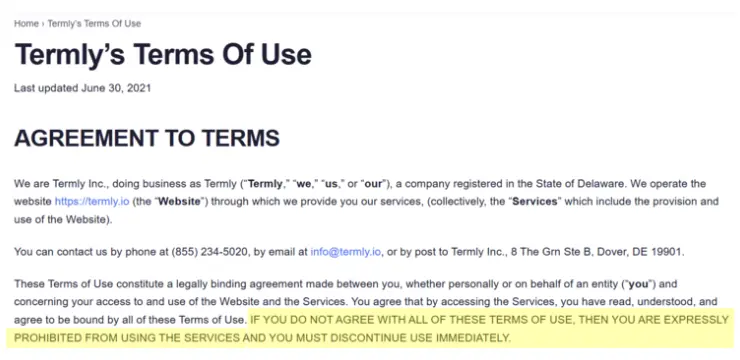
Toward the bottom of the image, our agreement makes it clear that continued use of our services indicates agreement with the terms.
Including an Acceptable Use Policy
An Acceptable Use Policy (AUP) defines what your users cannot do on your site. Most websites include the AUP in the Terms and Conditions; however, it can be a standalone document. Many site owners include it in their Terms to get user consent for both at once.
Here’s an example of how Canva presents its AUP. It’s clearly laid out and emphasizes that all users must follow these platform guidelines.
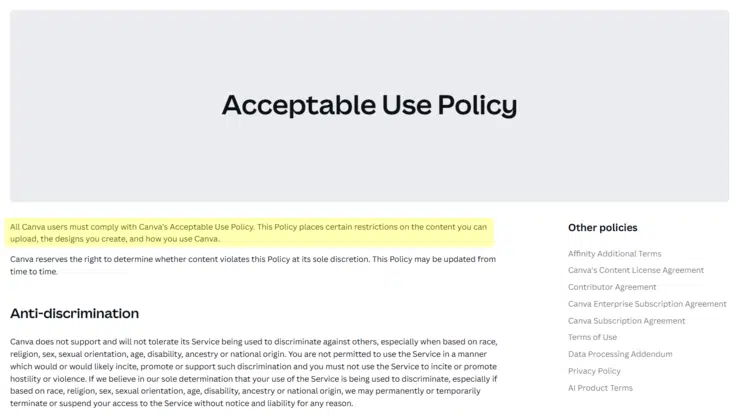
Canva’s AUP starts with a strong anti-discrimination clause, signaling a clear commitment to inclusivity while setting expectations from the start.
Disclaimers
Disclaimers are legal statements that help limit your liability by clarifying what your website is — and isn’t — responsible for. The type of disclaimer you need depends on your content, industry, and audience. Here are a few common examples:
- Affiliate Disclaimer – Informs users that you may receive compensation for promoting, reviewing, or recommending products or services on your website.
- Copyright Disclaimer – States that you own the content on your website, and it’s protected by copyright law, preventing unauthorized use.
- Fair Use Disclaimer – Clarifies you don’t own certain content used and are sharing it legally for purposes like commentary, criticism, or education.
- Legal Disclaimer – Explains that legal content on your website is general information and not a substitute for professional legal advice.
- Medical/Health Disclaimer – Explains that any health-related content is for informational purposes only and shouldn’t be taken as professional medical advice.
These are just a few of the many disclaimers you can include on your website. To view a more comprehensive breakdown of the different types of disclaimers — and to see real examples — visit our guide on disclaimer examples.
Shipping Policy
Clear shipping policies are essential if you sell physical products through your website.
They explain how orders are processed, expected delivery timeframes, shipping costs, and any potential delays customers should be aware of.
While not always legally required, having a shipping policy is highly recommended for:
- E-commerce businesses
- Brick-and-mortar stores with online sales
- Retail and specialty stores
A well-defined shipping policy can also help set expectations and build trust with your customers. For example, Gymshark’s delivery page outlines estimated shipping times by country, ensuring that customers know when to expect their orders based on their location.
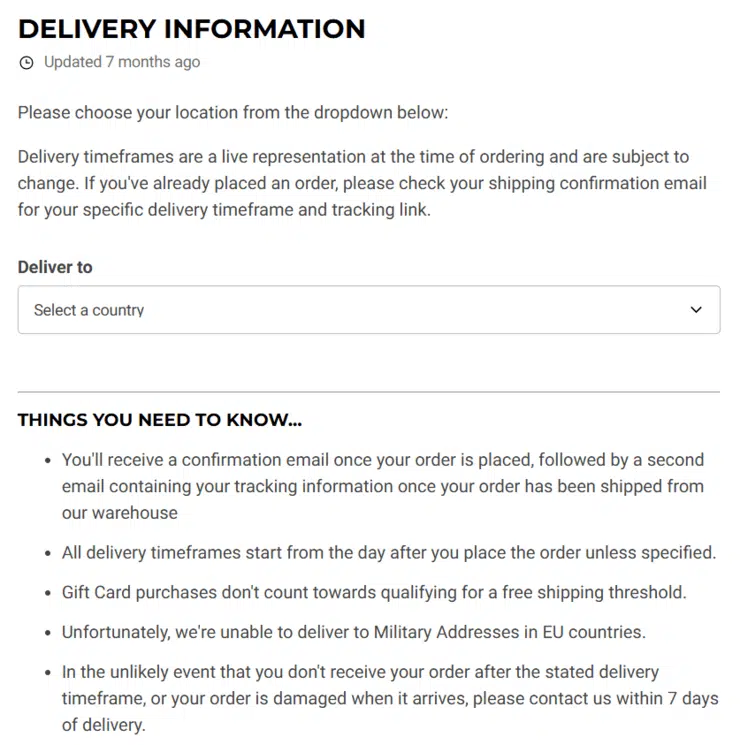
Return Policy
Return policies are equally important to set clear expectations around refunds, exchanges, and return eligibility. A good return policy explains how customers can initiate a return, any exceptions, and the condition products must be in.
Gymshark’s return policy, for instance, covers eligibility requirements, exceptions to their return rules, and provides clear instructions on how to start a return.
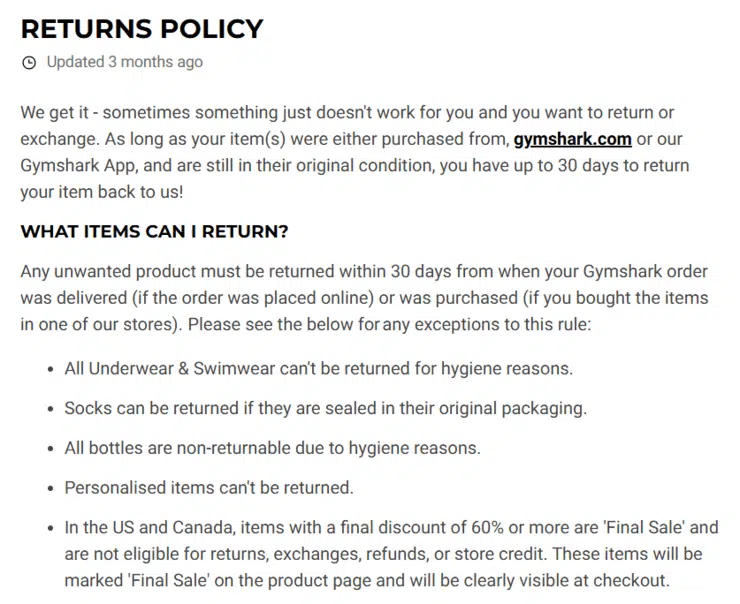
End-User License Agreement (EULA)
A EULA is a contract between a software provider and the end user. It grants the user a license to use the software under specific conditions while maintaining the provider’s ownership rights.
Below is an excerpt from Adobe’s EULA, which outlines the legal terms users must accept before installing or using their software.

It makes clear that installation means accepting the terms, restrictions, and liability limits.
Impressum
An Impressum, or Imprint, identifies who owns and operates the website and includes the business contact details.
It is legally required in countries like Germany, Austria, and Switzerland.
Here’s an example of an Impressum from Volkswagen, which includes legal and corporate information about the company.
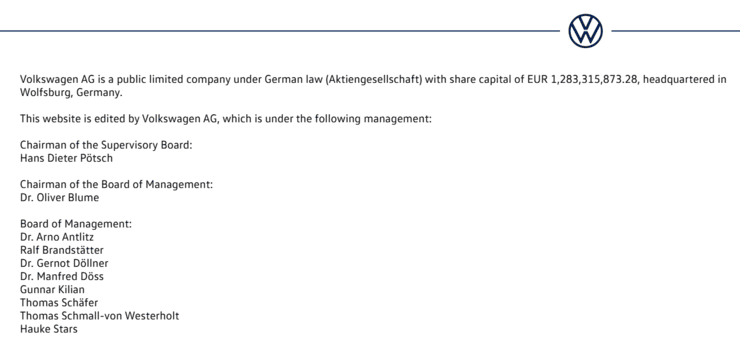
Volkswagen’s Impressum outlines its legal structure, registered location, and key leadership. This level of transparency helps meet German legal requirements and shows users who’s responsible for the site.
Accessibility Policy
An accessibility policy outlines your commitment to making your website usable for individuals with disabilities. It typically includes steps your business has taken (or plans to take), such as providing alt text for images, keyboard navigation support, or screen reader compatibility.
While not always legally required, it supports compliance with accessibility standards and signals inclusivity.
Here’s an example of an accessibility policy from Harvard University.
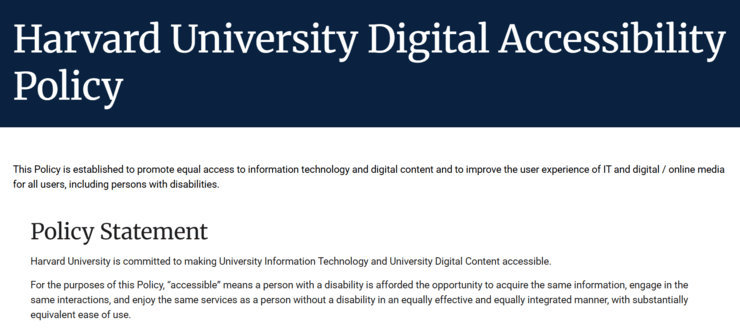
This example clearly defines what “accessible” means in practice and sets a strong tone by emphasizing equal access to digital content for all users, including those with disabilities.
Special Policies Based on Your Industry
In addition to the core website policies, a few additional ones may apply depending on your industry, audience, or where your business operates.
While not every website will need these, they’re important to consider if your site involves software, international users, regulated data, or accessibility standards.
These policies are often legally required — or expected — in specialized sectors like healthcare, education, nonprofit work, and SaaS.
Here are several industry-specific policies to be aware of:
- HIPAA Notice of Privacy Practices: Required for U.S. healthcare providers and businesses that handle protected health information (PHI). It explains how medical data is collected, used, and protected under HIPAA.
- Student Privacy Policy (FERPA Notice): Educational institutions in the U.S. may need to include a FERPA notice explaining how student records are handled.
- Donor Privacy Policy: Nonprofits that collect donor information should clearly explain how that data is stored, used, and protected — particularly to build trust with supporters.
- Cancellation & Refund Policy: Similar to a return policy, this policy sets expectations for how users can cancel purchases and when refunds are available. It is especially important for travel, ticketing, and subscription-based services.
Understanding which industry-specific policies apply to your website helps you meet professional requirements and align with the expectations of your field.
Even if these policies don’t apply to your website right now, they’re worth keeping in mind as your services evolve.
What Is a Website Policy?
A website policy is a document published on your website that explains how it operates, what your users can expect, and what rules or protections apply.
Your policy can include how you handle personal data, what’s allowed or prohibited, how purchases and returns are managed, and much more.
There are many different policies, each serving a specific purpose and helping establish clear communication between you and your users.
Why Do Businesses Need Website Policies?
Website policies matter for several key reasons — from meeting legal requirements to building trust with your users. In the sections below, we’ll discuss some of the most important benefits.
Legal Requirements
Specific website policies are legally required, while others are strongly recommended to help reduce risk and build user trust.
Below is a breakdown of which policies are required and which are considered best practices.
Legally Required (Depending on Jurisdiction and Activity)
- Privacy Policy: Required under laws like the CCPA, CalOPPA, PIPEDA, and other worldwide laws.
- Affiliate Disclaimer: Required by the FTC when endorsing products or services in exchange for compensation.
- Shipping & Return Policies: Required by the FTC Mail Order Rule, Consumer Rights Directive, and Consumer Contracts Regulations when selling physical products.
- Impressum: Required by the Telemedia Act (Germany), Media Act (Austria), and Federal Unfair Competition Act (Switzerland).
- HIPAA Notice of Privacy Practices: Required in the U.S. for healthcare providers and organizations that handle protected health information (PHI) in accordance with HIPAA.
- Student Privacy Policy: Required for U.S. educational institutions that handle student records under FERPA.
Recommended (But Not Legally Required)
- Cookie Policy: While a separate cookie policy isn’t strictly required, you must provide clear, accessible disclosures under the GDPR and ePrivacy Directive when using trackers.
- Terms and Conditions: Also known as Terms of Use or Terms of Service, it defines the rules for using your site and can help limit liability and protect your content.
- Copyright Disclaimer: It is not legally required, but it is useful for reinforcing ownership of your original content and deterring unauthorized use.
- Fair Use Disclaimer: Helps clarify that you’re using third-party content lawfully for legal purposes under Section 107 of the U.S. Copyright Act.
Understanding which website policies are required by laws helps ensure you meet legal obligations. While not every policy is mandatory, knowing what applies to your website is an essential first step to protecting your business.
Third-Party Service Requirements
Even if a specific website policy isn’t required by law, you may still be required to publish one depending on the tools you use to run your business.
Many third-party services include policy requirements — especially when user data is involved.
For example:
- Google Analytics requires a cookie policy and clear opt-in consent.
- Amazon Associates requires an affiliate disclaimer placed near affiliate links you share.
- Stripe requires you to display shipping and refund policies during the checkout process.
- Mailchimp’s Terms of Use says users must comply with all applicable privacy laws.
These are just a few notable examples — always review the terms of any service you use to ensure you meet their specific policy requirements.
Failing to meet the requirements listed above can lead to account suspension or loss of access to essential tools, so reviewing the terms of any service you use is important.
Build Trust With Consumers
Establishing clear website policies supports compliance efforts and fosters trust with your audience.
Transparency about data collection and usage can significantly influence consumer confidence.
According to Cisco’s 2024 Consumer Privacy Survey, 75% of respondents said they would not purchase from organizations they don’t trust with their data.
The same study also found that consumers are becoming increasingly aware of their country’s privacy laws.
Additionally, a Termly survey found that 78.1% of businesses felt no negative impact from privacy requirements and that 91.1.% of businesses are willing to prioritize data privacy if they knew it would increase customer trust and loyalty.
These findings highlight that there’s real value in prioritizing data privacy. Not only does it build customer trust, but many businesses report no negative impact from doing so.
Protect Your Business
Website policies don’t just assist with regulatory adherence — they also help safeguard your business from disputes, liability, and misuse.
For example:
- Terms and Conditions let you set rules for how users interact with your website and services, thus limiting liability.
- Disclaimers reduce legal risks — whether it be by disclosing affiliate relationships or clarifying that your content is for informational purposes.
- Shipping and return policies outline how purchases and refunds are handled, which can reduce customer disputes.
In some cases, missing or unclear policies can lead to serious consequences.
For example, in 2022, Sephora agreed to a settlement of $1.2 million for CCPA violations, one of which was the failure to disclose that it sold personal information in its privacy policy.
Having the right policies in place helps you set expectations, protect your content, and avoid costly legal conflicts.
Increases Data Safety and Security Online
Website policies play a behind-the-scenes role in strengthening your data practices.
By clearly outlining what data you collect, how it’s used, and how users can control it, you create a framework for more responsible data handling,
Transparency not only helps users feel more secure — it also encourages better internal practices, which can reduce the risk of breaches or misuse over time.
Proves You’re a Privacy-Literate Company
Displaying well-crafted website policies shows that your business understands the importance of data privacy.
That effort matters — especially because many users are skeptical.
A 2023 Pew Research study found that 61% of Americans believe privacy policies are ineffective at explaining how companies use their data.
Creating policies that are actually clear, accessible, and informative can help your business stand out as privacy-literate and trustworthy.
Does Termly Help Make Essential Website Policies?
So, how do you create an effective policy that’s not only legally sound but actually clear and useful for your audience?
That’s where Termly comes in.
Our policy generators are designed to walk you through a guided set of questions tailored to your business — like what data you collect, where your users are located, or how your services are delivered.
Based on your responses, they generate ready-to-publish policies that align with your needs.
You can create most of the policies listed in this guide using Termly’s tools:
- Privacy Policy Generator
- Cookie Policy Generator
- Terms and Conditions Generator
- Acceptable Use Policy Generator
- Disclaimer Generator
- Shipping Policy Generator
- Return Policy Generator
- End-user License Agreement Generator
- Impressum Generator
Each generator is designed to simplify the policy-making process and reflect legal standards.
While our tools stay updated as laws evolve, it’s still important to review and revise your policies — whether your business practices change or new legal requirements come into play.
Remember to always consult a qualified attorney to address your business’s specific needs.
Having clear, up-to-date website policies is essential for any business.
From privacy and cookie policies to disclaimers and shipping terms, this guide covered the 14 website policies you should know about — and how Termly can help you create them with ease.
Reviewed by Masha Komnenic CIPP/E, CIPM, CIPT, FIP Director of Global Privacy


